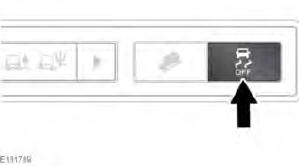Land Rover Discovery: Stability control
DYNAMIC STABILITY CONTROL (DSC)
- Dynamic Stability Control (DSC) is unable to compensate for driver misjudgement. It remains the driver's responsibility to drive with due care and attention, in a manner which is safe for the vehicle, its occupants and other road users.
- In extremely low temperatures below -20ºC, vehicles may initially have reduced stability and braking performance. In these conditions, drive with extra caution.
DSC is activated automatically when the ignition is switched on.
DSC maintains vehicle stability, even in critical driving situations. The system controls dynamic stability when accelerating and when starting from a standstill. Additionally, it identifies unstable driving behaviour, such as understeer and oversteer and helps to keep the vehicle under control by manipulating the engine output and applying the brakes at individual wheels.
Some noise may be generated when the brakes are applied.
SWITCHING DSC OFF
Safety may be reduced by inappropriately disabling Dynamic Stability Control (DSC). In the majority of driving situations, and particularly on-road, it is recommended that DSC is not disabled.
DSC must be switched off when traction devices are fitted.
In some driving conditions it may be appropriate to disable DSC to improve traction. These conditions include:
- Rocking the vehicle out of a hollow or deep rut.
- Pulling away in deep snow, or when on a loose surface.
- Driving through deep sand or mud.

The DSC OFF button is located on the centre console.
To disable DSC, press and briefly hold the DSC OFF button. A chime will sound and the Message centre will temporarily display DSC OFF to confirm. The DSC OFF warning lamp will illuminate.
Deactivating DSC also reduces the level of Electronic Traction Control (ETC) intervention and may lead to an increase in wheel spin.
SWITCHING DSC ON
Note: Dynamic Stability Control (DSC) is enabled automatically at the start of each ignition cycle.
To switch DSC on, press and release the DSC OFF button. The Message centre will temporarily display DSC ON to confirm.
The DSC OFF warning lamp will also extinguish.
Note: Some of the Terrain response programs will automatically switch DSC on.

